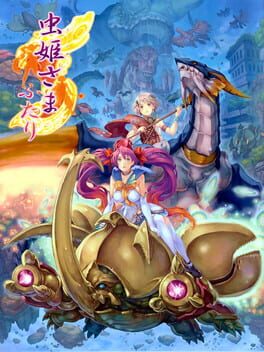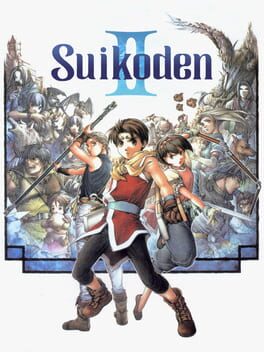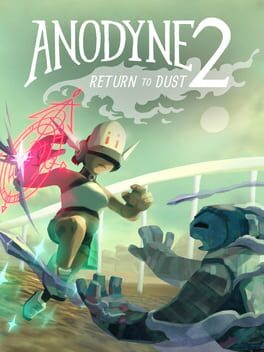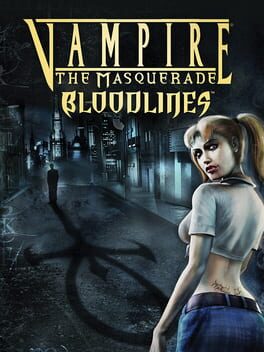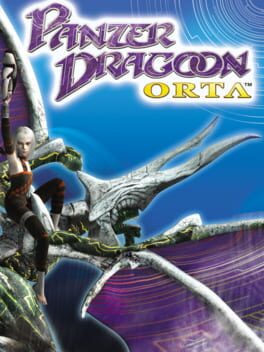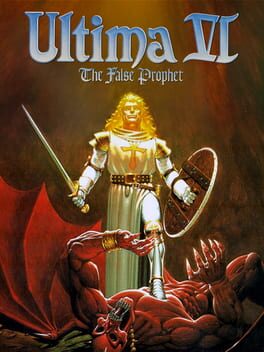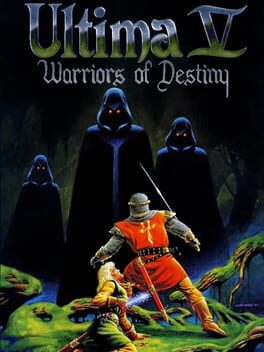MobileSuitLilah
Bio
Nothing here!
Badges

Popular
Gained 15+ followers

2 Years of Service
Being part of the Backloggd community for 2 years

GOTY '22
Participated in the 2022 Game of the Year Event

Gone Gold
Received 5+ likes on a review while featured on the front page

Liked
Gained 10+ total review likes

Best Friends
Become mutual friends with at least 3 others

Noticed
Gained 3+ followers
Favorite Games
076
Total Games Played
009
Played in 2024
002
Games Backloggd
Recently Played See More
Recently Reviewed See More
VtM: Bloodlines is a game that I love almost in spite of itself. The vision at it's core is a compelling one - a goth CRPG heavy on dialogue and roleplaying, with deep character creation, a reactive take on the World of Darkness, and systems aimed at simulating the experience of being a vampire. When the game manages to execute on that vision, as it does for most of its first half, there's nothing else like it. There's a dark, palpable atmosphere as you explore the early hubs and dig up interesting sidequests, lure humans into dark alleys to feed, surf the local goth clubs and go through memorably creepy levels like the oft-praised, very haunted Ocean House Hotel. Depending on what clan you choose, your experience interacting with that world can shift dramatically - I played as a hot charismatic Toreador who talked her way through most situations, but I've still not dug into the Tremere (who wield freaky blood magic), the Malkavian (who get significantly different dialogue and hear voices throughout the whole game) or the Nosferatu (whose monstrous appearance requires stealth around humans). Even after 20 years, there still hasn't been another game like it, and it remains gaming's definitive take on vampires.
Unfortunately, it's all wrapped in the skin of a pretty weak Deus Ex-like with bad combat and unsatisfying stealth. While the game rustles up some memorable levels when those levels are focused on narrative, the stealth + combat focused areas are uniformly uninspired, full of repetitive corridors that fail to conjure a sense of place or put the game's systems to any interesting use.
That's fine during the first half, because the focus is much more heavily on role-playing, exploration, and narrative. But as you continue past that, the game's infamous development woes cause the game to start falling apart at the seams in real time. The later hubs start to shrink and become progressively less interesting to explore. There's an increasing reliance on long, repetitive dungeons, including a septic odyssey that ranks among gaming's worst-ever sewer levels. An increasing focus on combat culminates in a series of unavoidable, ultra-hard boss fights with damage-sponge bosses (even with a nearly-maxed out firearms skill, I had to turn on god mode and infinite ammo). The writing isn't spared either, partially thanks to an unpleasant late-game visit to Chinatown that's steeped in racism.
A decade ago, when I first played this, I was unequivocally in love with it. And despite the flaws, I still love it now - I was deep in its clutches until the last few hours, and even then considered starting another playthrough as a different clan. But this is a deeply frustrating game, with very high highs and very low lows. Troika got a raw deal from Activision, and deserved a chance to more fully execute on their vision
Unfortunately, it's all wrapped in the skin of a pretty weak Deus Ex-like with bad combat and unsatisfying stealth. While the game rustles up some memorable levels when those levels are focused on narrative, the stealth + combat focused areas are uniformly uninspired, full of repetitive corridors that fail to conjure a sense of place or put the game's systems to any interesting use.
That's fine during the first half, because the focus is much more heavily on role-playing, exploration, and narrative. But as you continue past that, the game's infamous development woes cause the game to start falling apart at the seams in real time. The later hubs start to shrink and become progressively less interesting to explore. There's an increasing reliance on long, repetitive dungeons, including a septic odyssey that ranks among gaming's worst-ever sewer levels. An increasing focus on combat culminates in a series of unavoidable, ultra-hard boss fights with damage-sponge bosses (even with a nearly-maxed out firearms skill, I had to turn on god mode and infinite ammo). The writing isn't spared either, partially thanks to an unpleasant late-game visit to Chinatown that's steeped in racism.
A decade ago, when I first played this, I was unequivocally in love with it. And despite the flaws, I still love it now - I was deep in its clutches until the last few hours, and even then considered starting another playthrough as a different clan. But this is a deeply frustrating game, with very high highs and very low lows. Troika got a raw deal from Activision, and deserved a chance to more fully execute on their vision
An exciting inflection point for the Ultima series, one where the series' burgeoning interest in world-building and world-simulation collides with improved technology to create the most immersive take on Britannia yet. Everything feels more vivid thanks to mind-blowing 256-color VGA graphics! All of Britannia is now seamless - the overworld and towns no longer happen on different maps! Every NPC has their own character portrait, schedule and personality, and the keyword-and-text-parser based conversation system is meatier and more fun to navigate than ever!
Ultima VI also has an unprecedented-for-1990 potential for absolute tomfoolery within its gameplay systems. Wanna lock an NPC in their home while they're asleep and stop them from going to work? You can! Wanna make guards pass out by casting a sleep field next to them and shoving them into it? Go for it!
Combined with Ultima's usual open-endedness (as always you can tackle your vague objectives and traverse Britannia in just about any order you'd like) and you have an all-time classic sandbox RPG. You can still see its influence snaking out through everything from open world games to the immersive sim genre to the flexible gameplay systems of Larian's RPGs
Ultima VI also has an unprecedented-for-1990 potential for absolute tomfoolery within its gameplay systems. Wanna lock an NPC in their home while they're asleep and stop them from going to work? You can! Wanna make guards pass out by casting a sleep field next to them and shoving them into it? Go for it!
Combined with Ultima's usual open-endedness (as always you can tackle your vague objectives and traverse Britannia in just about any order you'd like) and you have an all-time classic sandbox RPG. You can still see its influence snaking out through everything from open world games to the immersive sim genre to the flexible gameplay systems of Larian's RPGs
For me, Ultima V is defined by a tension between the exciting ambitions of its worldbuilding and the frustrations of its approach towards the traditional strictures of the CRPG.
Ultima V is fascinating, a game that subverts the groundbreaking moral structure of its predecessor by transforming its moral principles into tools of absolutist violence. Its vision of an oppressed Britannia is dark, bleak, and more immersive than ever before, thanks to an impressive-for-1988 devotion to world simulation (there's a day-night cycle! NPCs have their own schedules! you can sit in a chair!) and more fleshed-out writing in NPC conversations.
But my favorite thing about it is its progression. The conversation system is based around keywords and a text parser - a character may have a key piece of information on how to defeat the Shadowlords and free Britannia, but you won't know to ask them about it unless you've spoken to another character halfway across the world. With a journal in hand, this turns the game into an exercise in cross-continent detective work, requiring you to gather and follow-up on clues and leads as you travel from town to town and seek out every human settlement in Britannia. This is where the game shines, requiring you to explore and forcing you to sit with the world the development team has built and see the effects Lord Blackthorn's violent rule has had on the people of Britannia.
Unfortunately Ultima V also wants to be an RPG, and this is where it's at its weakest. I've never been a big fan of the combat in this era of Ultima, and it continues to be relatively slow and tedious here. Character progression takes a frustratingly long time - an unbelievable amount of XP is required to hit the max level of 8, and only the character who deals the killing blow to an enemy gets any XP from it. To top it off, magic kills give no XP whatsoever, cutting off a lot of the tactical usefulness of combat spells, and in classic CRPG fashion, dying down-levels you and removes a significant amount of XP. None of this was much of a problem until I hit the combat-heavy dungeons, most of which are required to get many of the items needed to finish the game. Even after a full 20 hours with a smaller party of 4 characters (out of a max of 8), my Avatar was only level 6, with most of the rest of my party at levels 4 or 5. Suffice to say, getting through the final dungeon was a struggle and I nearly gave up a handful of times.
It's been a decade since I played the first four Ultimas, but I don't remember the combat grating on me so much before. Some cursory reading on the internet confirms that a lot of these problems are unique to Ultima V - combat is harder here and plays a more central role, and it's a lot less forgiving when it comes to doling out XP. While it's in keeping with the game's bleak world and atmosphere, it's also a bummer, and takes away from the game's very real strengths.
Ultima V is fascinating, a game that subverts the groundbreaking moral structure of its predecessor by transforming its moral principles into tools of absolutist violence. Its vision of an oppressed Britannia is dark, bleak, and more immersive than ever before, thanks to an impressive-for-1988 devotion to world simulation (there's a day-night cycle! NPCs have their own schedules! you can sit in a chair!) and more fleshed-out writing in NPC conversations.
But my favorite thing about it is its progression. The conversation system is based around keywords and a text parser - a character may have a key piece of information on how to defeat the Shadowlords and free Britannia, but you won't know to ask them about it unless you've spoken to another character halfway across the world. With a journal in hand, this turns the game into an exercise in cross-continent detective work, requiring you to gather and follow-up on clues and leads as you travel from town to town and seek out every human settlement in Britannia. This is where the game shines, requiring you to explore and forcing you to sit with the world the development team has built and see the effects Lord Blackthorn's violent rule has had on the people of Britannia.
Unfortunately Ultima V also wants to be an RPG, and this is where it's at its weakest. I've never been a big fan of the combat in this era of Ultima, and it continues to be relatively slow and tedious here. Character progression takes a frustratingly long time - an unbelievable amount of XP is required to hit the max level of 8, and only the character who deals the killing blow to an enemy gets any XP from it. To top it off, magic kills give no XP whatsoever, cutting off a lot of the tactical usefulness of combat spells, and in classic CRPG fashion, dying down-levels you and removes a significant amount of XP. None of this was much of a problem until I hit the combat-heavy dungeons, most of which are required to get many of the items needed to finish the game. Even after a full 20 hours with a smaller party of 4 characters (out of a max of 8), my Avatar was only level 6, with most of the rest of my party at levels 4 or 5. Suffice to say, getting through the final dungeon was a struggle and I nearly gave up a handful of times.
It's been a decade since I played the first four Ultimas, but I don't remember the combat grating on me so much before. Some cursory reading on the internet confirms that a lot of these problems are unique to Ultima V - combat is harder here and plays a more central role, and it's a lot less forgiving when it comes to doling out XP. While it's in keeping with the game's bleak world and atmosphere, it's also a bummer, and takes away from the game's very real strengths.
